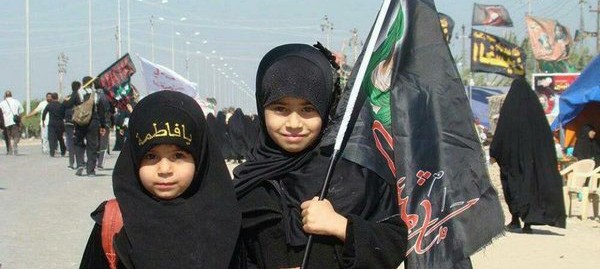The pilgrimage of Arbaeen has begun. In the world’s largest annual gathering of people, Shia Muslims from across the world throng to the city of Karbala in Iraq to mark the fortieth day after the death anniversary of Imam Husain, the grandson of the Prophet Muhammad who was killed during the Battle of Karbala in the seventh century. Last year, the event attracted 2.5 crore pilgrims. This year, attendance is expected to cross three crore.
Undeterred by prolonged sectarian violence in the region and threats from the Sunni Arab-dominated militant group Islamic State, thousands of Indian pilgrims are making the journey to Iraq to visit the shrine of Imam Husain.
“I am not afraid of ISIS no one can stop me from visiting Karbala for Arbaeen,” said Indian pilgrim Sakina Abbas before departing for Iraq.
The most notable part of the pilgrimage is the 80-km ceremonial walk from the city of Najaf to the shrine in Karbala. Dressed in black as a symbol of mourning, barefoot pilgrims must reach Karbala before Arbaeen, which is on December 3 this year.
Among those making the journey is Mehdi Raza, a pilgrim from Lucknow. “I had this in mind for years and now my wish has been granted,” said 68-year-old Raza. “I am honoured to be part of this walk.” The journey takes two to three days on average and involves around 24 hours of walking. People from Iran and countries sharing a land border with Iraq often start the pilgrimage from their homes.
Bound for Iraq
The pilgrimage holds great significance for Shia Muslims in particular. Pilgrims usually travel in groups. A religious visa is issued to a group of at least 16 pilgrims and only if the trip is arranged by an approved travel agency in India with counterparts in Iraq, according to Mumbai’s Al-Mahdi Travels. The visa allows pilgrims to make a single journey not longer than 15 days.
This year, Al Mahdi Travels has enlisted 100 pilgrims for Arbaeen. “We have a fixed quota of people. Another travel agency in Delhi has apparently taken 120 pilgrims to Karbala,” said an agent with Al-Mahdi Travels.
The Iraqi consulate in Mumbai said it had received more than 20,000 visa applications this year, with at least 8,500 approved so far. Unlike last year, the embassy has refused to issue visas on arrival over fears that recipients may proceed to other parts of Iraq and Syria for non-peaceful purposes.
Symbol of devotion
The participants are not limited to Shia Muslims, with people from other Islamic sects and even other religions joining in. Delhi resident Manoj Dutt, 52, travalled to Iraq in 2012. “The faith in Imam Husain is worth saluting," he said. "The way millions reach there and the management of the event is amazing. I remember my journey from Najaf to Karbala: free food, accommodation and medical facilities were available for everyone.”
Like most years, security concerns loom large over the pilgrimage. Hardline Sunni groups consider Shias apostates and use this reasoning to justify killing and attacks on sacred places. ISIS has issued warnings to pilgrims this year and last week, the Iraqi army foiled a terror plot after finding explosives hidden among dolls and other toys.
Despite the threats, the number of pilgrims continues to swell every year. By chanting "Labbaik Ya Husain" throughout the walk, the pilgrims pledge their service to Husain and the idea of fighting for justice.
Spiritual leader and founder of Art of Living, Sri Sri Ravishankar, witnessed this devotion first-hand in 2007 and 2010. In an interview to a national newspaper, he said: “The situation there was very grave but the faith of the people even in the worst period of terrorism was unshakeable. I wish the religious sentiments of Shias are honoured and sense prevails among those who try to desecrate their sacred places.”
/149
source : Scroll.in
Wednesday
2 December 2015
7:10:23 AM
722598
Central Asia & SubcontinentImportant StoriesMiddle EastSpecial Pages | Mourning of Imam HussainSpecial Pages | News of Arba'een
Indian Shias flock to Iraq for the world's biggest pilgrimage

More than three crore Muslims are expected to gather in Karbala for Arbaeen, which commemorates the martryrdom of Imam Husain (AS) in the seventh century.
